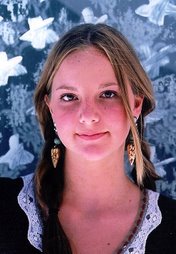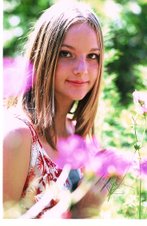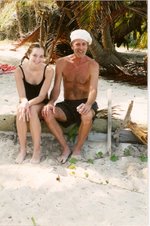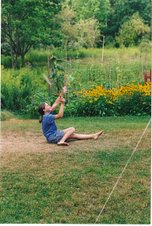
Gedney's photographs
 I found a link to Gedney's pictures in Elizabeth's laptop. He was a photographer who lived in Brooklyn, and had a great feeling for people. What Gedney had to say about the city is how Elizabeth felt about it.
I found a link to Gedney's pictures in Elizabeth's laptop. He was a photographer who lived in Brooklyn, and had a great feeling for people. What Gedney had to say about the city is how Elizabeth felt about it.From his journal: The physical image of a city is said to mirror the soul of the people who built it.
"There are very legitimate reasons for including a walk along a street or through a particular area of a city to develop an idea in a film. Dr Siegfried Kracauer has defined it in his interesting "Theory of film": 'The Street in the extended sense of the word is not only the arena of fleeting impressions and chance encounters but a place where the flow of life is bound to assert itself... the kaleidoscopic sights mingle with unidentified shapes and fragmentary visual complexes....' For more pictures try this link.
http://scriptorium.lib.duke.edu/gedney/thumbs/newyork/newyork2.html
What Kind of Reader I Am, by Elizabeth G. Aakre
English 199
Gorra
First Response “What kind of reader are you?”
Elizabeth Aakre
9.12.06
I can’t remember being taught to read, and, because my parents can’t either, I’ve come to assume that I was simply born knowing how. Or at least that’s how I feel; like reading has and always will be a natural part of my life.
When I was really young I read as much as I could, competing with other girls in my class to see how many books we could read in a week. It was about quantity, not understanding, but also about being proud of having a skill: I could read quickly. I loved to read all day, sometimes finishing two or three books and see them stacked by my bed at night, knowing that I had gotten through so much. I would read anything, but particularly liked fantasy, the tomboys who trained dragons or wanted to become knights. I could get caught up in those golden worlds easily, daydreaming only of cutting my hair short and running away and being fierce and mean.
I started reading more for understanding, and the love of that musty smell, when I was 12 or so. Suddenly I couldn’t read so quickly anymore. What was wrong with me? Why didn’t I understand what the first 30 pages of James Joyce’s Ulysses meant? Couldn’t I read anything I want? I was humbled and embarrassed, but kept reading at a pretty steady pace – enjoying learning new words and practicing them on boys I had crushes on. “Do you even know what psychedelic means?” I would taunt, not understanding fully either.
I don’t remember the first ‘adult’ book I read, but there was no turning back. I decided that before I turned 20 I was going to read all of the classics. Little did I know that everyone has a different list of what the classics are, and what a lofty goal that was. I still read every day, or try to, but not nearly as quickly as I used to. I’d like to attribute this mostly to reading more closely, but I know some of the slowness has to do with being more distractible than I used to be.
My favorite books now have some of the same traits that those fantasies had; long sweeping plots, endless connections and possibilities, and of course, a heroin. One of my favorite heroines is the main character in Shirley Jackson’s We Have Always Lived in the Castle. I first read the book when I was 14. I felt like I was seven again. I tore through it in a couple of hours and then read it again the next day. The book affected me in emotional way that was quite childlike, an almost awe. Instantly I had a new genre of books that I had to read all of: mystical, suspense driven psychologically emotional books.
Though the name of the genre I love is ugly and rambling, some of the authors within it are the most concise and bright in the world. Henry James and Iris Murdoch, William Faulkner and Flannery O’Connor. These are the authors I’ve been trying to speed through over the years. But the things is, I can’t bring myself to miss a word in their sentences, just to finish their book faster. I couldn’t miss Faulkner’s only punctuation mark in the chapter due to haste, I couldn’t! So I have slowed down my pace and widened my horizons and have turned into a reading addict.
Gorra
First Response “What kind of reader are you?”
Elizabeth Aakre
9.12.06
I can’t remember being taught to read, and, because my parents can’t either, I’ve come to assume that I was simply born knowing how. Or at least that’s how I feel; like reading has and always will be a natural part of my life.
When I was really young I read as much as I could, competing with other girls in my class to see how many books we could read in a week. It was about quantity, not understanding, but also about being proud of having a skill: I could read quickly. I loved to read all day, sometimes finishing two or three books and see them stacked by my bed at night, knowing that I had gotten through so much. I would read anything, but particularly liked fantasy, the tomboys who trained dragons or wanted to become knights. I could get caught up in those golden worlds easily, daydreaming only of cutting my hair short and running away and being fierce and mean.
I started reading more for understanding, and the love of that musty smell, when I was 12 or so. Suddenly I couldn’t read so quickly anymore. What was wrong with me? Why didn’t I understand what the first 30 pages of James Joyce’s Ulysses meant? Couldn’t I read anything I want? I was humbled and embarrassed, but kept reading at a pretty steady pace – enjoying learning new words and practicing them on boys I had crushes on. “Do you even know what psychedelic means?” I would taunt, not understanding fully either.
I don’t remember the first ‘adult’ book I read, but there was no turning back. I decided that before I turned 20 I was going to read all of the classics. Little did I know that everyone has a different list of what the classics are, and what a lofty goal that was. I still read every day, or try to, but not nearly as quickly as I used to. I’d like to attribute this mostly to reading more closely, but I know some of the slowness has to do with being more distractible than I used to be.
My favorite books now have some of the same traits that those fantasies had; long sweeping plots, endless connections and possibilities, and of course, a heroin. One of my favorite heroines is the main character in Shirley Jackson’s We Have Always Lived in the Castle. I first read the book when I was 14. I felt like I was seven again. I tore through it in a couple of hours and then read it again the next day. The book affected me in emotional way that was quite childlike, an almost awe. Instantly I had a new genre of books that I had to read all of: mystical, suspense driven psychologically emotional books.
Though the name of the genre I love is ugly and rambling, some of the authors within it are the most concise and bright in the world. Henry James and Iris Murdoch, William Faulkner and Flannery O’Connor. These are the authors I’ve been trying to speed through over the years. But the things is, I can’t bring myself to miss a word in their sentences, just to finish their book faster. I couldn’t miss Faulkner’s only punctuation mark in the chapter due to haste, I couldn’t! So I have slowed down my pace and widened my horizons and have turned into a reading addict.
Birthday
Nineteen years ago today Elizabeth Genevieve Aakre was born in St. Vincent's hospital in New York City. It was the happiest day of my life.
The Day the Bed Fell on My Toe
It was the week that schools were out, and I was making my bed with my mommy. All that week, that is, Monday and Tuesday, I had been going to camp. This was different than going to school. My mom had to make my lunch for one thing. Which was baloney which I love. I also get to have cookies, and my mom bought some fig newtons just for me.
Something else happened the week before which you should know about. It was Easter. And Easter means eating candy. So I had gotten a gigantic chocolate bunny, tiny Easter eggs made out of chocolate, and flowers made out of chocolate. I got a lot of candy. CANDY. And the night before Easter I went to Lenesa's house and got about a ton of candy in my stomach.
So there we were, in my bedroom, my mommy sort of crabby about my room, because it was so messy. In the morning I have to brush my teeth, wash my face, and comb my hair, make my bed. But Tuesday night, my mom said this bed hasn't been made. And she pulled the covers back and found chocolate on the bed sheet. So she yanked the bed and the whole bed fell on my toe.
I said "OW!" and I started to cry like crazy. My toe turned black and purple for a change. It really hurt. My mommy gave me some advil crushed up which tasted terrible. She called the doctor and the doctor said, if it really hurts, bring her in and I will make a hole in her toe nail.
That night I couldn't sleep. My toe hurt. I slept with my mommy. Daddy slept in my bedroom.
The next day, my mommy brought me to the doctor. The doctor made a hole in my toe. First he took a cigarette lighter and with a paper clip that he had unbended he made the paper clip clean by burning the tip of it. He put the paper clip in my toe. He stuck it way deep in my toenail. I pushed on my mommy like crazy to get me out of this place. And I said OHHH OWWWOHooooh !!!!" . After the black went away.
The doctor said, "it's supposed to not hurt Elizabeth. You are a brave girl." Then the nurse, Donna, put on a band aid. My mom said, "That's a pretty band aid with a rose on it." And the doctor said, "That's not a rose, it's Ariel." Oh.
Then I got six super balls, one white, one blue, one orange, one red, one green, and another. The sticker I put on my shirt said, "I'm a terrific kid." My mom and I went outside where a street vendor was selling oranges and mangoes. We bought some, they were really good. We ate two oranges in the taxi on the way to my mom's school.
Elizabeth wrote this April 23, 1995 when she was seven.
Something else happened the week before which you should know about. It was Easter. And Easter means eating candy. So I had gotten a gigantic chocolate bunny, tiny Easter eggs made out of chocolate, and flowers made out of chocolate. I got a lot of candy. CANDY. And the night before Easter I went to Lenesa's house and got about a ton of candy in my stomach.
So there we were, in my bedroom, my mommy sort of crabby about my room, because it was so messy. In the morning I have to brush my teeth, wash my face, and comb my hair, make my bed. But Tuesday night, my mom said this bed hasn't been made. And she pulled the covers back and found chocolate on the bed sheet. So she yanked the bed and the whole bed fell on my toe.
I said "OW!" and I started to cry like crazy. My toe turned black and purple for a change. It really hurt. My mommy gave me some advil crushed up which tasted terrible. She called the doctor and the doctor said, if it really hurts, bring her in and I will make a hole in her toe nail.
That night I couldn't sleep. My toe hurt. I slept with my mommy. Daddy slept in my bedroom.
The next day, my mommy brought me to the doctor. The doctor made a hole in my toe. First he took a cigarette lighter and with a paper clip that he had unbended he made the paper clip clean by burning the tip of it. He put the paper clip in my toe. He stuck it way deep in my toenail. I pushed on my mommy like crazy to get me out of this place. And I said OHHH OWWWOHooooh !!!!" . After the black went away.
The doctor said, "it's supposed to not hurt Elizabeth. You are a brave girl." Then the nurse, Donna, put on a band aid. My mom said, "That's a pretty band aid with a rose on it." And the doctor said, "That's not a rose, it's Ariel." Oh.
Then I got six super balls, one white, one blue, one orange, one red, one green, and another. The sticker I put on my shirt said, "I'm a terrific kid." My mom and I went outside where a street vendor was selling oranges and mangoes. We bought some, they were really good. We ate two oranges in the taxi on the way to my mom's school.
Elizabeth wrote this April 23, 1995 when she was seven.
In the Shower
The Pantene Pro V so belonged to her.
I am almost done with it,
have almost used it up--
one less object that she touched,
one less reminder daily of her beauty,
her long blond hair and its clean smell.
I can’t cry on cue the way he wants me to.
If I could I would do it here
in the shower
where the tears would wash down
the drain with my flakes of skin
and shedded hair.
I cry when I am about to enter our building
unlocking the front door with its big square key.
In the elevator I tip my face in the corner
where she will never stand again.
I feel more kinship with wartorn parents
whose children have been killed than
my next door neighbor with her two living daughters.
As my tears fall I think of the millions of others
who have grieved over the one they loved deepest.
My tears are but a tiny drop in an ocean
of salt water.
I am almost done with it,
have almost used it up--
one less object that she touched,
one less reminder daily of her beauty,
her long blond hair and its clean smell.
I can’t cry on cue the way he wants me to.
If I could I would do it here
in the shower
where the tears would wash down
the drain with my flakes of skin
and shedded hair.
I cry when I am about to enter our building
unlocking the front door with its big square key.
In the elevator I tip my face in the corner
where she will never stand again.
I feel more kinship with wartorn parents
whose children have been killed than
my next door neighbor with her two living daughters.
As my tears fall I think of the millions of others
who have grieved over the one they loved deepest.
My tears are but a tiny drop in an ocean
of salt water.
Subscribe to:
Posts (Atom)
How Dina Aunty relished her memories. Mummy and Daddy were the same, talking about their yesterdays and smiling in that sad-happy way while selecting each picture, each frame from the past, examining it lovingly before it vanished again in the mist. But nobody ever forgot anything, not really, though sometimes they pretended, when it suited them. Memories were permanent. Sorrowful ones remained sad even with the passing of time, yet happy ones could never be re-created—not with the same joy. Remembering bred its own peculiar sorrow. It seemed so unfair: that time should render both sadness and happiness into a source of pain.
> From A Fine Balance by Rohinton Mistry
> From A Fine Balance by Rohinton Mistry





















